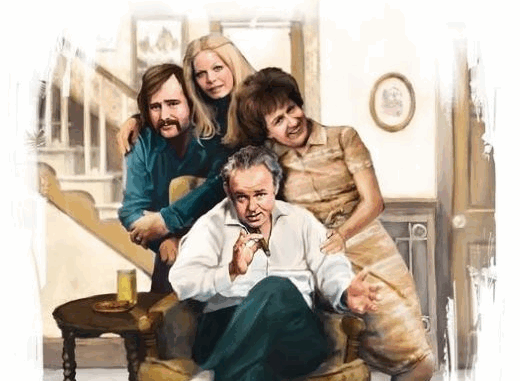
All in the Family redefined the American sitcom with Archie Bunker’s controversial views and unforgettable clashes with his liberal son-in-law. Explore why this Emmy-winning series still resonates decades later.
A Bold, Honest Look at Real-Life Tensions
Premiering in 1971, All in the Family quickly became one of the most influential sitcoms in American television history. At the heart of the show was Archie Bunker, a blunt, working-class man whose bigoted views often clashed with the changing world around him. Played by the legendary Carroll O’Connor, Archie represented a generation resistant to progress—and the show never shied away from holding up a mirror to society.
The Power of Conflict: Archie vs. “Meathead”
Archie’s worldview was constantly challenged by his liberal son-in-law, Mike Stivic (nicknamed “Meathead”), portrayed by Rob Reiner. Their fiery debates—often funny, often uncomfortable—tackled real-life issues like racism, feminism, war, religion, and class divides. Few shows had the courage to talk about these subjects at the time, and All in the Family did it every week in prime time.
The dynamic between the outspoken Archie and the idealistic Mike made for explosive television, but it was never one-sided. The show gave both perspectives a voice, showing viewers the complexity of generational and ideological clashes.
An Award-Winning Cast That Made TV History
The cast was a powerhouse:
-
Carroll O’Connor as Archie Bunker
-
Jean Stapleton as Edith, his sweet and patient wife
-
Rob Reiner as Mike, the son-in-law
-
Sally Struthers as Gloria, Archie’s loving yet strong-willed daughter
Their chemistry and performances helped the show earn 22 Primetime Emmy Awards, making it one of the most decorated sitcoms of its time.
Why All in the Family Still Matters Today
Decades later, All in the Family remains relevant because the themes it tackled—prejudice, fear of change, family tension—are still present. Archie Bunker wasn’t a villain; he was a product of his time, and the show used humor to explore how people can grow (or not grow) in response to societal shifts.
The series paved the way for shows like The Jeffersons, Maude, and Good Times—each spinning off from All in the Family‘s daring storytelling and social commentary.
Final Thoughts
All in the Family wasn’t just a sitcom—it was a cultural revolution. It challenged taboos, sparked national conversations, and brought raw honesty into American living rooms. Archie Bunker may have been narrow-minded, but his story helped open the minds of millions.